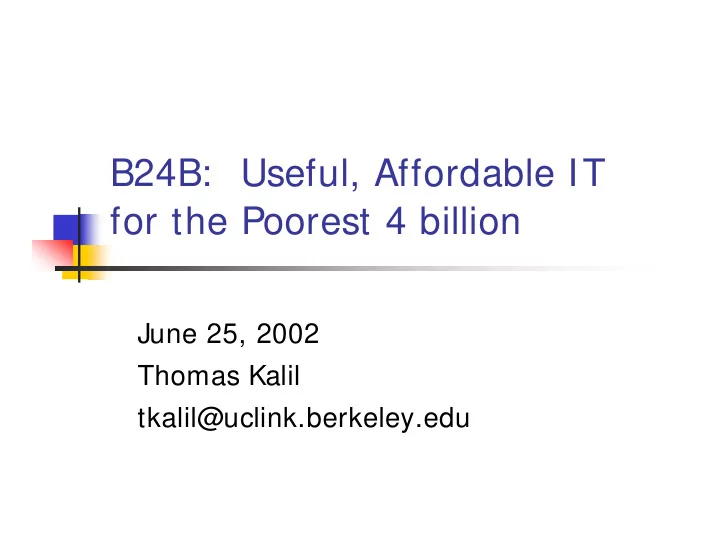

B24B: Useful, Affordable IT for the Poorest 4 billion June 25, 2002 Thomas Kalil tkalil@uclink.berkeley.edu
Grand challenge ! Provide affordable, useful digital services to the 4 billion people on the planet earning less than $1,500 ! Not a homogenous group, differences between urban and rural poor ! IT is not the answer to development challenges, but it is a powerful tool
Benefits and applications ! Price discovery – rural farmers able to double incomes by discovering price of their crops in the capital city ! Exports to developed country markets ! Job creation (jobs like data entry that can be shifted to developing countries) ! E-health (health information, remote consultation using digital cameras, public health networks) ! Natural disaster -- early warning of floods, monsoons, etc.
Benefits and applications ! Reducing corruption from increased transparency (e.g. e-gov for transfer on land titles) ! Transfer of dollars from diaspora – networked diaspora as a development resource ! Coordination of transportation and distribution (e.g. crops to markets) ! Entertainment ! Developing country “communities of practice” ! Preservation and global sharing of local culture
Metrics for success ! Access metrics: ! # of people with connectivity within walking distance ! Affordability: less than a cup of coffee per day ! Demonstration of sustainable business models (charity won’t scale) – such as GrameenPhone, Internet cafes, El Salvadorian telecenters
Metrics for success ! Development metrics ! Economic growth and job creation ! # of people who cross the poverty line ! Increased percentage of population with basic literacy ! Reduced mortality and morbidity from diseases as a result of e-health ! Increased access to clean water (as a result of monitoring) ! Free flow of information – reduced ability of governments to control (supports democratization)
Technical challenges ! Ultra-low cost devices and systems (e.g. plastic displays) ! Codesign of devices and infrastructure (much simpler devices) ! HCI that supports low levels of literacy, multiple languages ! Power w.o. power grid (e.g. power harvesting, handcrank)
Technical challenges ! Radically simpler software and systems ! Easy creation of locally relevant information services ! Easy way for global participation (Development@home – like SETI@Home ! Low cost sensors ! More aggressive use of unlicensed spectrum or UWB (e.g. relax power restrictions) ! Longer-lives for devices
Social/organizational challenges ! Get IT firms to see B24B as a market, not a charity case ! Supportive developing country policies (no extortionate prices for leased lines) ! Support/incubate developing country entrepreneurs ! Technical community has feedback from real users through testbeds
Final thoughts ! Clearly not the grand challenge that will drive computer science BUT ! You’ll want to tell your grandchildren you worked on this
Recommend
More recommend